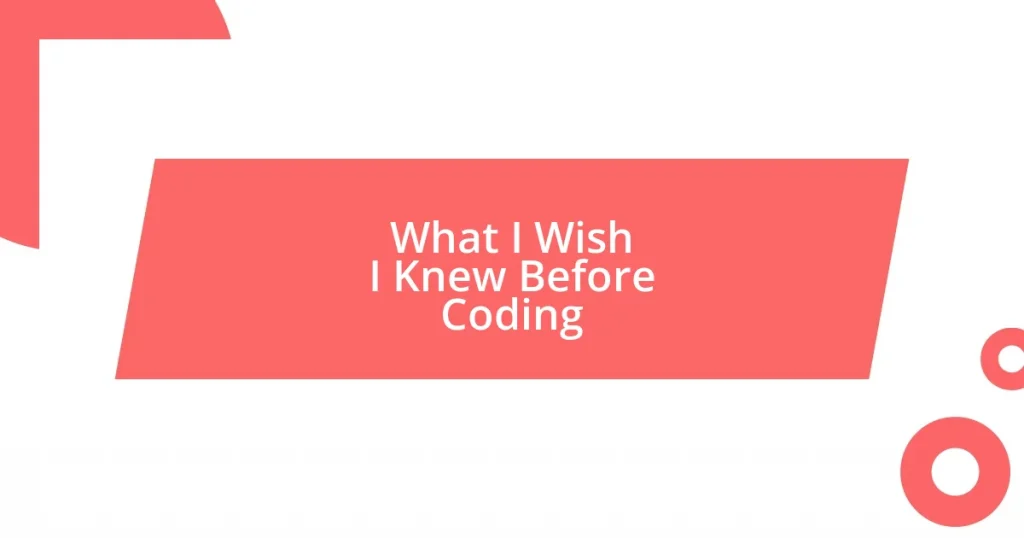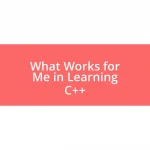Key takeaways:
- Understanding coding fundamentals is essential; gaining clarity on basic concepts like variables and functions can lead to empowering “aha” moments.
- Choosing the right programming language should align with your goals and interests, considering community support and available resources to enhance learning.
- Developing problem-solving skills and maintaining a supportive learning environment can greatly impact your coding journey and overall confidence.
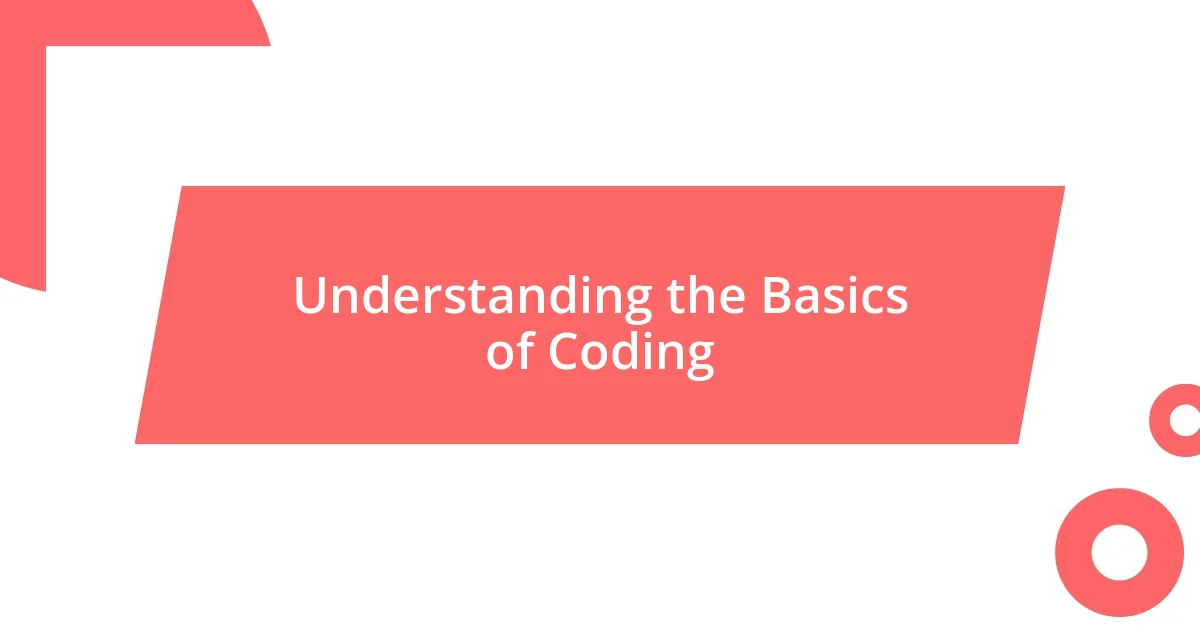
Understanding the Basics of Coding
When I first dipped my toes into coding, I quickly realized that understanding the fundamentals is crucial. I remember feeling overwhelmed by all the terminology—variables, loops, and functions felt like a foreign language at first. It wasn’t until I grasped these basic concepts that everything started to click, transforming my confusion into excitement.
One significant moment for me was when I finally understood how a simple “if” statement worked. The realization that I could control the flow of my program with just a couple of lines was empowering. Have you ever experienced that “aha” moment when a complex idea suddenly makes sense? It’s a game-changer, and it helps establish a solid foundation that supports more advanced programming concepts down the line.
As I navigated through coding tutorials and projects, I discovered that practice truly is the key. I often made mistakes, which at times felt disheartening, but those errors were invaluable learning opportunities. Each bug I encountered taught me something new, showing me that mastering the basics isn’t just about memorizing; it’s about applying that knowledge within real-world scenarios. It’s this blend of theory and practice that cements your understanding and keeps you motivated to keep learning.
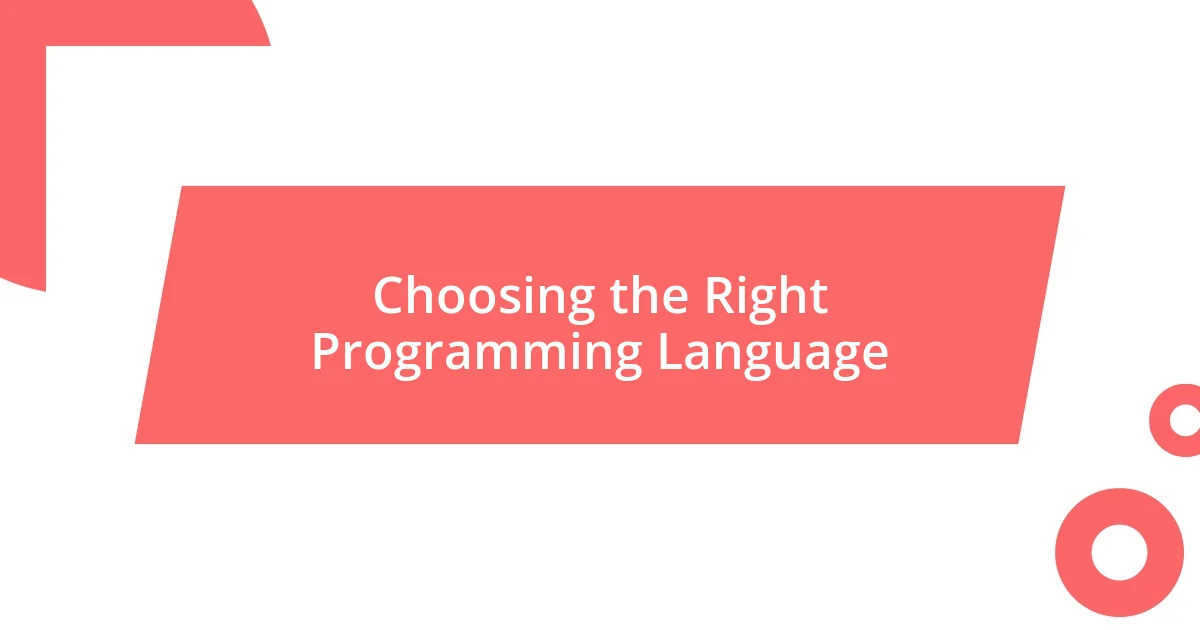
Choosing the Right Programming Language
Choosing the right programming language can feel daunting, especially with so many options available. I remember standing at a crossroads when I first started, contemplating whether to dive into Python or JavaScript. I selected Python for its simplicity, but looking back, I wish I had explored JavaScript sooner since it’s invaluable for web development. Have you ever faced a similar choice where one option seemed easier but the other could open more doors?
As you assess which language to learn, consider your goals. If you’re drawn to data science or automation, Python is a fantastic choice. On the other hand, if web development excites you, JavaScript is essential. I’ll never forget the moment a friend told me about building interactive interfaces with JavaScript; it made me realize how impactful a good programming language can be on a project. Reflecting on my journey, I increasingly value languages that align with my interests and career aspirations.
Lastly, think about the community and resources available for each language. When I was starting, I found immense help in Python’s community, which made troubleshooting way easier. If I had chosen a language with fewer resources, I might have felt more isolated and frustrated. Your language choice can significantly influence your learning experience, so weigh these factors carefully.
| Programming Language | Best For |
|---|---|
| Python | Data Science, Automation |
| JavaScript | Web Development |
| Java | Enterprise Applications |
| C# | Game Development |
| Ruby | Web Applications |
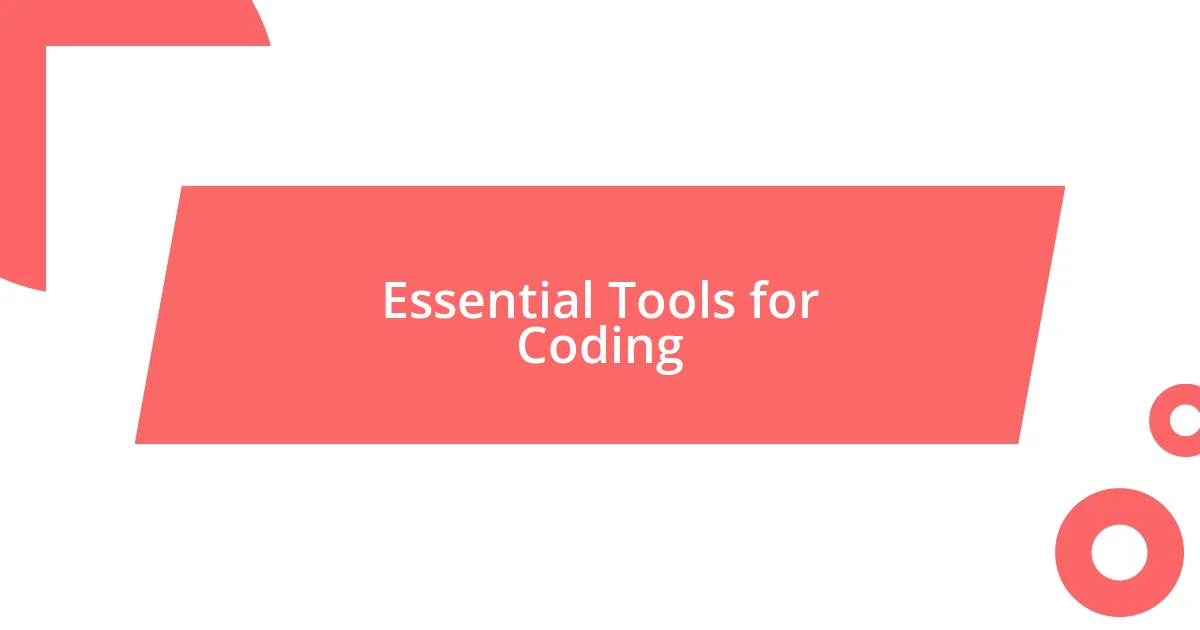
Essential Tools for Coding
Essential Tools for Coding
When I first started coding, having the right tools felt like a game changer. I vividly remember my struggle with text editors that couldn’t highlight syntax correctly. It was frustrating until I discovered Integrated Development Environments (IDEs) like Visual Studio Code. This tool not only made my code easier to read, but also streamlined my workflow with features like debugging and extensions. It truly felt like I had unlocked a new level in my coding journey.
- Text Editors: Lightweight options like Notepad++ or Sublime Text are perfect for quick edits.
- IDEs: Visual Studio Code, JetBrains IDEs, or Eclipse offer powerful features for larger projects.
- Version Control: Git and GitHub are invaluable for tracking changes and collaborating with others.
- Terminal/Command Line: Familiarizing yourself with the command line can enhance efficiency in navigating files and running scripts.
- Debugging Tools: Browser developer tools, or built-in debuggers in IDEs, help identify issues in your code.
- Package Managers: npm for JavaScript or pip for Python simplify the management of libraries and dependencies.
Having these tools at your disposal not only eases the coding process but also builds a sense of confidence. I remember feeling empowered the first time I effectively used Git for version control during a group project—the clarity it provided in tracking our progress and changes was remarkable. These essential tools helped me solidify my coding habits and truly take ownership of my work.
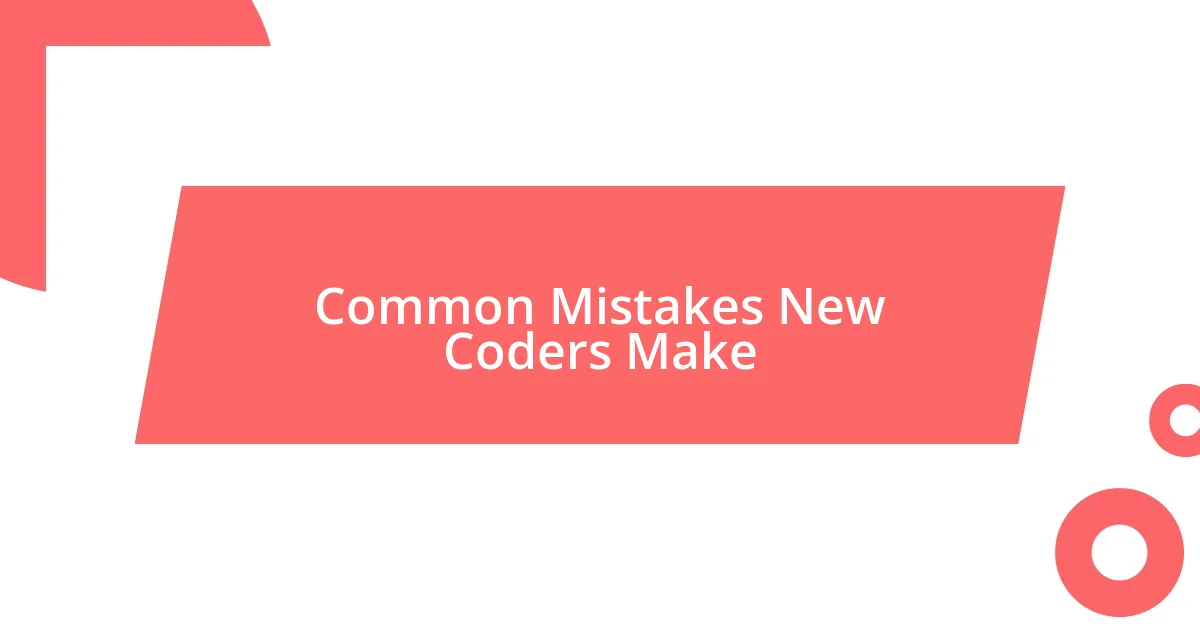
Common Mistakes New Coders Make
One common mistake I see new coders make is skipping the basics. I remember feeling impatient, wanting to dive straight into complex projects, only to realize later how crucial a solid foundation is. It’s like building a house; neglecting the basics can lead to a shaky structure down the road. Have you ever rushed through something only to look back and wish you’d taken the time to understand it better?
Another frequent pitfall is not seeking help when stuck. In my early coding days, I often wrestled with problems longer than necessary instead of turning to forums or peers. The support available in coding communities is fantastic, and utilizing it can save you hours of frustration. It took me a while to learn that asking for help is not a sign of weakness but rather a step toward growth.
Lastly, new coders often underestimate the value of testing their code. I used to think that as long as my code ran, everything was fine. However, I eventually learned that thorough testing is essential for catching bugs and ensuring reliability. When I first embraced testing frameworks, it felt like I was adding a safety net to my projects. How did I ever code without taking this crucial step?
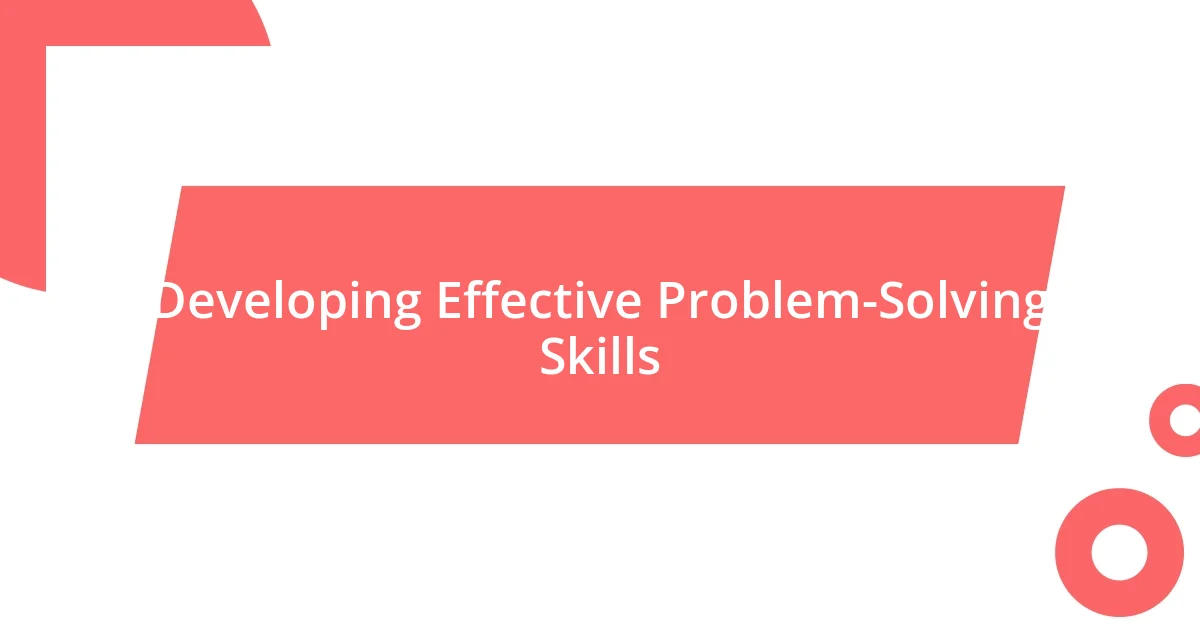
Developing Effective Problem-Solving Skills
Developing effective problem-solving skills is vital in coding, and I can’t emphasize enough how powerful it feels to tackle a challenging bug. Early on, I faced an issue where my code wouldn’t compile. Rather than panicking, I took a step back and broke the problem down into smaller parts. This approach not only helped me identify the error but also fostered a sense of accomplishment when I finally fixed it. Have you ever felt that thrill when solving a tough challenge?
I recall a specific project where I hit a roadblock due to a failing function. Instead of spiraling into frustration, I learned to ask myself the right questions. What assumptions was I making? Could there be a simpler way to approach this? This habit of questioning helped me develop a more analytical mindset, allowing me to see solutions from different angles. It’s remarkable how rephrasing your approach can uncover new pathways.
One of the most enlightening moments in my coding journey was realizing that problem-solving isn’t just about finding the solution—it’s about understanding why the solution works. I remember spending hours troubleshooting a complex issue, only to have that “aha!” moment when the reasoning behind the fix clicked into place. Embracing this deeper understanding transformed my coding practices. Have you experienced that shift where you not only solve a problem, but also grasp the underlying principles? It can be a game changer in your development process.
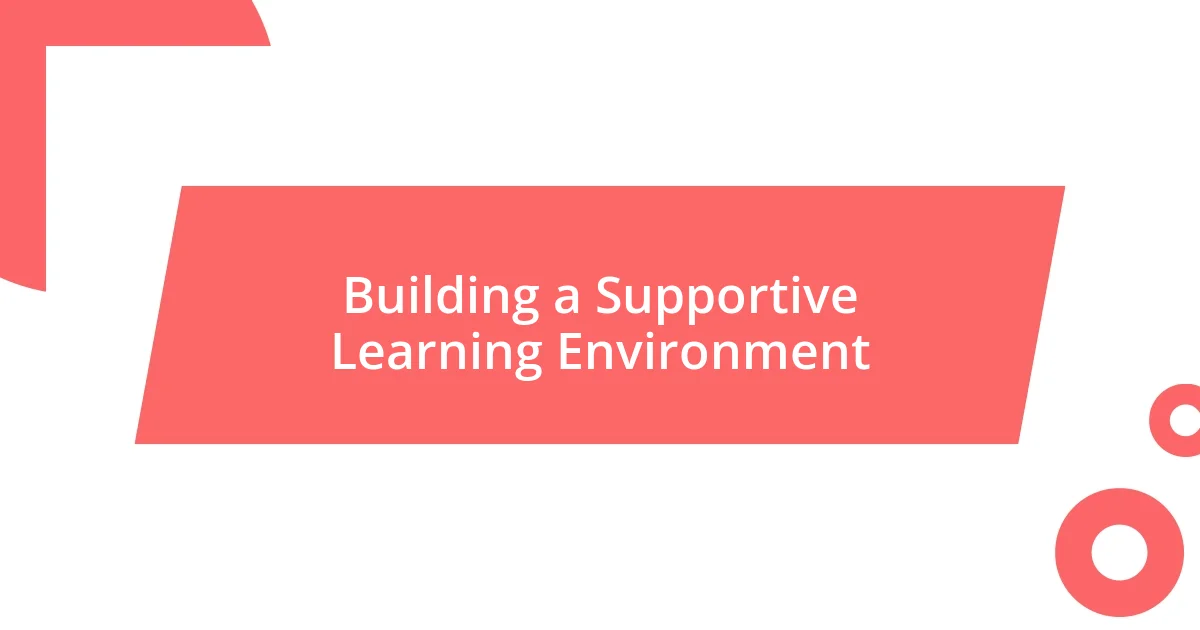
Building a Supportive Learning Environment
Creating a supportive learning environment is crucial for developing coding skills. In my own experience, having a study group transformed my learning process. We would meet regularly, each tackling our unique challenges, and I found that discussing code with peers not only clarified my understanding but also made the experience enjoyable. Have you ever realized how much more you learn when you explain something to someone else?
Another key aspect is fostering an open and encouraging atmosphere, especially when making mistakes. I recall a time in a workshop where someone struggled with a basic concept and hesitated to share their confusion. Seeing the instructor respond with patience and a willingness to walk through the problem together made a lasting impact. It reminded me that vulnerability is part of the learning process. Isn’t it reassuring to know that everyone faces challenges, and that sharing those moments can bring us closer together?
Lastly, I believe in the power of diverse learning resources. I remember how exploring different platforms, from interactive tutorials to coding boot camps, helped me discover my preferred learning style. It was like finding a treasure trove of knowledge tailored just for me. How often do we overlook the variety of resources available? A supportive environment encourages exploration, enabling us to learn in ways that resonate with our unique journeys.
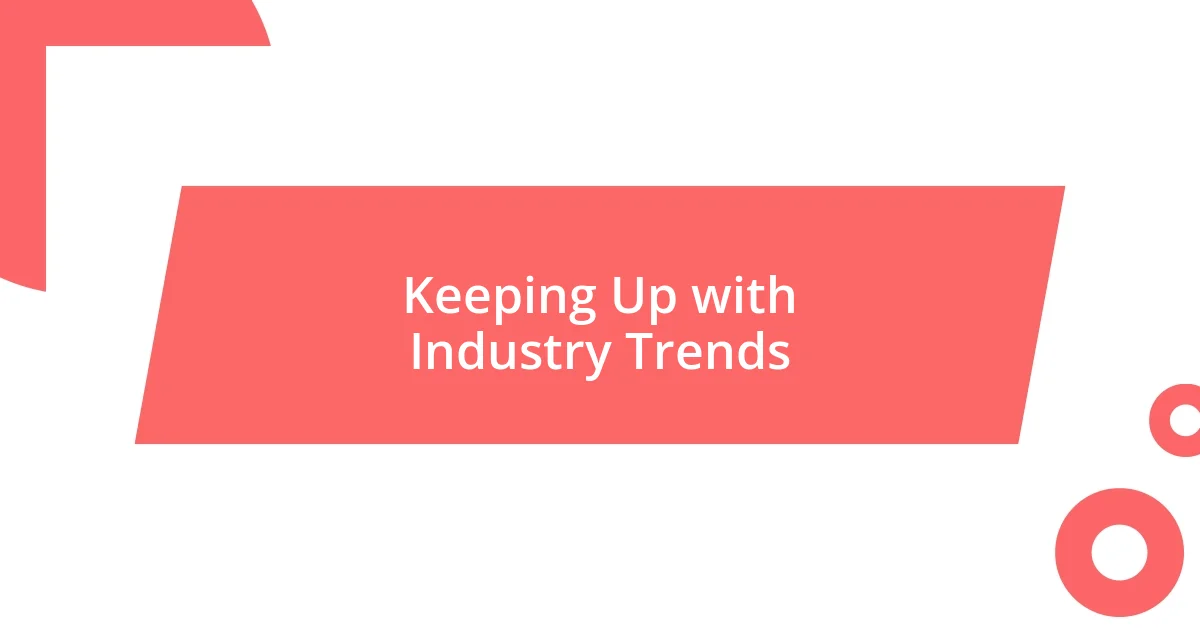
Keeping Up with Industry Trends
Staying current with industry trends can feel overwhelming at times, but it’s essential for any coder. I remember the first time I encountered a new framework that took the industry by storm—I felt a mix of excitement and anxiety. I thought, “How can I keep up with this?” My answer came from following experts on social media and subscribing to tech newsletters, which transformed the way I absorbed new information. It was like opening a floodgate to a world of knowledge that kept me inspired and informed. Have you found any sources that help you stay updated?
Participating in community events and meetups has also been a game changer for me. The energy at these gatherings is infectious, and engaging with fellow coders often leads to unexpected insights. I once attended a local coding conference where a speaker highlighted emerging trends that I hadn’t even considered. It sparked a new interest in areas like artificial intelligence. Conversations over coffee during breaks revealed how others were adapting their skills to stay relevant, and I walked away inspired to dive deeper into those topics. Have you experienced that moment when a casual chat ignites a new passion for you?
Lastly, I can’t stress enough the value of continuous learning. I vividly remember signing up for an online course after realizing that my skill set was becoming outdated. Diving into new technologies not only boosted my confidence but also reignited my passion for coding. I often ask myself: if I don’t continue to learn, how can I expect to grow? This mindset has led me to seek opportunities for growth, whether through online platforms or collaborative projects, turning the pressure of keeping up into a fulfilling journey of discovery.










